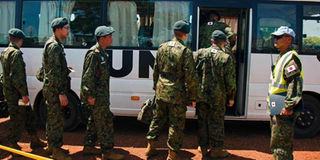UN peacekeeping chief defends cost of missions

Members of the Japanese Ground Self-Defence Force (GSDF) board a bus heading to the base at the compound of the United Nations peacekeeping mission (UNMISS) upon their arrival in Juba, South Sudan, on November 21, 2016. Washington plans to cut money spent on peacekeeping missions. PHOTO | ALBERT GONZALEZ FARRAN | AFP
What you need to know:
- Ladsous also criticized what he called a lack of support from members of the UN Security Council.
- US military officials and diplomats also worry the cuts will reduce Washington's ability to play a leading role in the world.
UNITED NATIONS
United Nations peacekeeping missions, under threat from budget cuts if Washington's promise to slash its UN spending goes ahead, are already costing as little as possible, a UN official said Friday.
The comments come after US President Donald Trump this month proposed to cut Washington's contribution to UN peacekeeping operations — the largest share of funding for the organisation's missions — to 25 per cent of their total budget, compared to just under 30 per cent today.
"We are doing our utmost to spend as little as possible" and "modernize", Herve Ladsous, the outgoing head of peacekeeping operations, said during his final news conference after six years in his post.
"We diminished the cost per peacekeeper by 16 per cent without a diminution of their quality," he added, noting that the US-based Rand Corporation think-tank recently calculated that UN-managed operations cost four times less than it would cost a large Western country.
"Sixteen missions and 120,000 men deployed around the world for 0.4 per cent of the world's military expenditure, it's still very little," Ladsous said.
"We have always tried to reformat missions, whenever possible, to be as economical as possible," he added.
"We review mandates, staffing and equipment on a regular basis," he said, pointing to the closure of missions to Ivory Coast, Liberia and Haiti, which would result in "hundreds of millions of dollars in savings."
Ladsous is set to be replaced by another French diplomat, Jean-Pierre Lacroix, who takes office for a one-year term in April after Ladsous declined an offer to stay on.
Ladsous also criticized what he called a lack of support from members of the UN Security Council who he said are sometimes too lenient toward governments that obstruct the work of peacekeeping missions, including South Sudan's.
He had recommended an arms embargo against Africa's newest country, a measure supported by Britain, France and the United States but rejected by the Security Council in December thanks to opposition by China and Russia.
Discussed at the council on Thursday, a resolution could still be put to a vote.
The Security Council should also continue the UN's mission in the Democratic Republic of the Congo, its largest — at 19,000 troops — and one of its oldest, Ladsous said.
Maintaining the operation at the current force is necessary because of electoral turmoil in the country, he added.
Trump's plan for severe cuts to US funding has alarmed the United Nations, along with US allies and international NGOs.
US military officials and diplomats also worry the cuts will reduce Washington's ability to play a leading role in the world.





